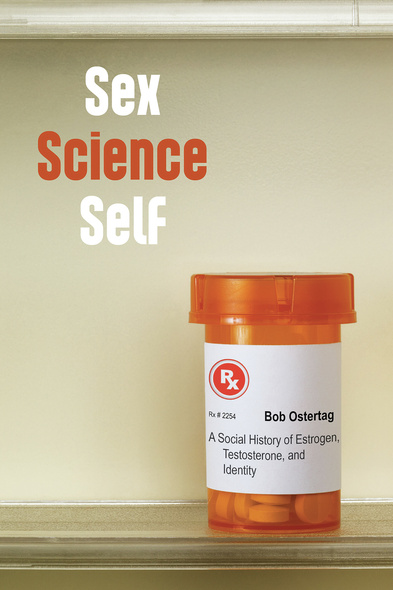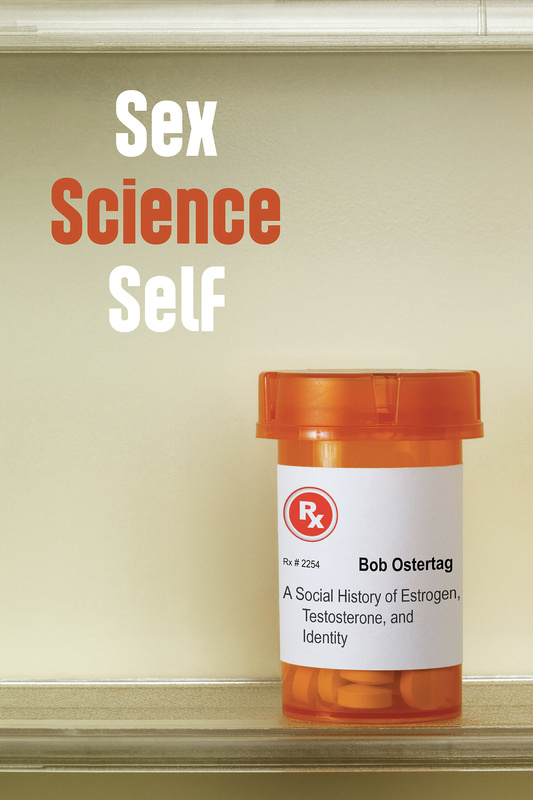Sex Science Self
A Social History of Estrogen, Testosterone, and Identity
By Bob Ostertag
University of Massachusetts Press
In Sex Science Self, Bob Ostertag cautions against accepting and defending any technology uncritically—even, maybe even especially, a technology that has become integrally related to identity. Specifically, he examines the development of estrogen and testosterone as pharmaceuticals.
Ostertag situates this history alongside the story of an increasingly visible and political lesbian, gay, bisexual, and transgender population. He persuasively argues that scholarship on the development of sex hormone chemicals does not take into account LGBT history and activism, nor has work in LGBT history fully considered the scientific research that has long attempted to declare a chemical essence of gender. In combining these histories, Ostertag reveals the complex motivations behind hormone research over generations and expresses concern about the growing profits from estrogen and testosterone, which now are marketed with savvy ad campaigns to increase their use across multiple demographics.
Ostertag does not argue against the use of pharmaceutical hormones. Instead he points out that at a time when they are increasingly available, it is more important than ever to understand the history and current use of these powerful chemicals so that everyone—within the LGBT community and beyond—can make informed choices.
In this short, thoughtful, and engaging book, Ostertag tells a fascinating story while opening up a wealth of new questions and debates about gender, sexuality, and medical treatments.
Ostertag situates this history alongside the story of an increasingly visible and political lesbian, gay, bisexual, and transgender population. He persuasively argues that scholarship on the development of sex hormone chemicals does not take into account LGBT history and activism, nor has work in LGBT history fully considered the scientific research that has long attempted to declare a chemical essence of gender. In combining these histories, Ostertag reveals the complex motivations behind hormone research over generations and expresses concern about the growing profits from estrogen and testosterone, which now are marketed with savvy ad campaigns to increase their use across multiple demographics.
Ostertag does not argue against the use of pharmaceutical hormones. Instead he points out that at a time when they are increasingly available, it is more important than ever to understand the history and current use of these powerful chemicals so that everyone—within the LGBT community and beyond—can make informed choices.
In this short, thoughtful, and engaging book, Ostertag tells a fascinating story while opening up a wealth of new questions and debates about gender, sexuality, and medical treatments.
Sex Science Self makes a significant contribution to the field of LGBT studies by placing debates about trans identity and politics in a new, provocative context. Wonderfully written, the book guides its readers through a great deal of complicated scientific material in clear, direct, and highly readable language, making it both accessible and completely engaging.'—Michael Bronski, author of A Queer History of the United States
'The overwhelming notion one gets from his writing is compassion.'—Bay Area Reporter
'Ostertag poses provocative questions about the influence of hormones on sexual orientation and gender identity, the medicalization of gender identity, and how the pharmaceutical industry has profited from multiple demographics using estrogen and testosterone.'—Choice
'Sex Science Self is a bold, argumentative, contentious, and provocative book. In equal measure, it is also insightful, stimulating, and brilliant.'—Journal of American History
Bob Ostertag is professor of cinema and digital media at the University of California, Davis. He is the author of three books, including Creative Life: Music, Politics, People, and Machines. He is also an internationally known composer, performer, instrument builder, activist, and journalist. More information about his work can be found on his website, bobostertag.com.





